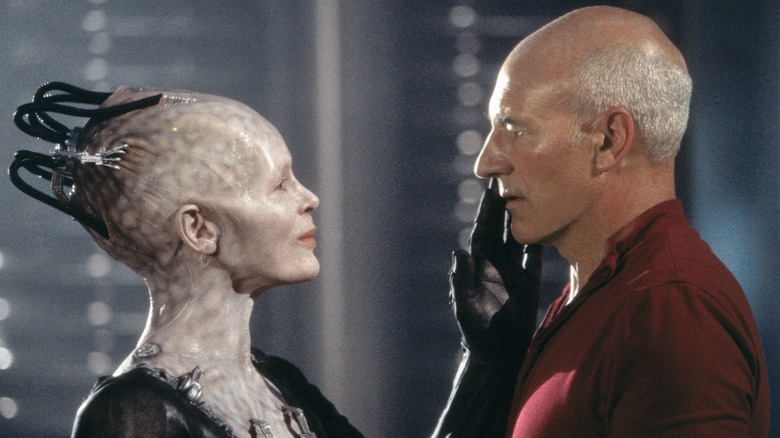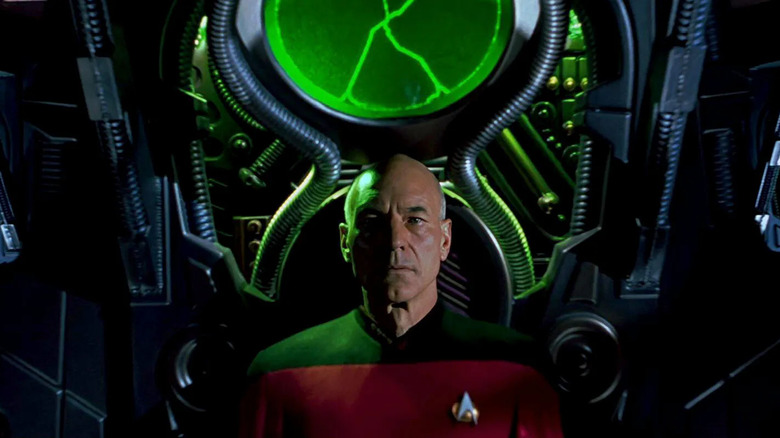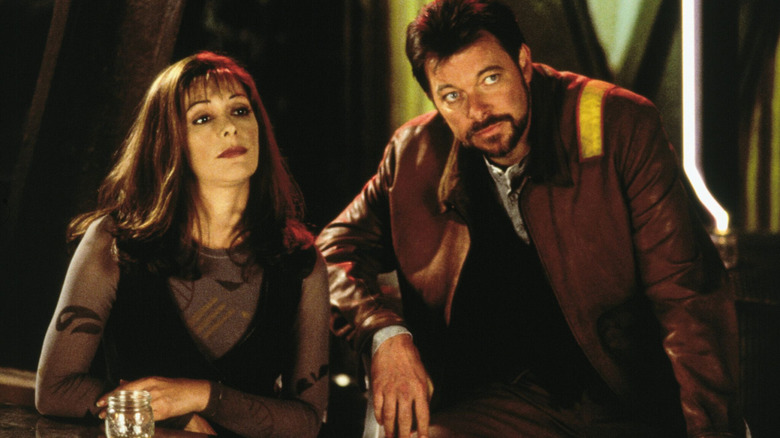Patrick Stewart Credits Jonathan Frakes For Star Trek: First Contact Being The Best TNG Movie
From 1994 to 2002, four feature films were made based on "Star Trek: The Next Generation." Generally speaking, none of the four films was terribly well-received. Stuart Baird's 2002 film "Star Trek: Nemesis" currently holds a 38% approval rating on Rotten Tomatoes, while David Carson's 1994 film "Star Trek: Generations" stands with a 48% approval rating. Jonathan Frakes' 1998 film "Star Trek: Insurrection" fares slightly better with a 55% approval rating, while the same director's 1996 film "Star Trek: First Contact" is far and away the champion, with a 93% approval rating. Rotten Tomatoes, of course, is not meant to be a gauge of factual, unassailable quality, but those numbers do pretty accurately reflect a generally accepted popular opinion among Trekkies.
"First Contact" stands out as the best for numerous reasons. For one, it was a film about the Borg, a soulless species of destructive cyborgs that had long been a favorite villain on "Next Generation." It was also the most action-forward film of the four, featuring more phaser fire, more starship battles, and more hand-to-hand combat than any Trek movie until 2009. It also featured a new ship, the U.S.S. Enterprise-E, as well as a fun time-travel plot wherein the Enterprise crew got to travel to 2063 to meet Zefram Cochrane (James Cromwell), a vital figure in "Star Trek" lore.
According to Patrick Stewart (the stalwart Captain Picard), the reason "First Contact" stood out was solely due to the energetic direction from Jonathan Frakes. Frakes, who played Commander William Riker on NextGen, had already directed eight episodes of the show before making his feature directorial debut with "First Contact." In his new autobiography "Making It So: A Memoir," Stewart complimented Frakes' directing acumen and admired his ability to step up to a feature with aplomb.
'This was the big leagues'
"First Contact" was made for a budget of $45 million, but its special effects are glittering and slick and look as good as a film with twice its budget. Also, unlike "Star Trek: Generations," "First Contact" felt more like a cinematic experience, rather than a mere expanded episode of the show. This was a properly large production, and Stewart was impressed with Frakes' ability to fall right into place on a feature, and force his cast to knuckle under and be more intense. He wrote:
"'First Contact' marked Jonathan Frakes's debut as a feature-film director. We had all loved being directed by him during the show's run, but here he really elevated his game. Jonathan is a funny, light-hearted man who always creates a positive atmosphere on the set, but this time, he sharpened our focus, demanding of us an emotional authenticity beyond what we'd given on the show. This was the big leagues, after all."
Stewart also said that he liked "First Contact" because of the arc for Jean-Luc Picard. Although he had been working through a bout of Borg-related trauma from six years earlier, the events of "First Contact" caused something to flare up in his mind, turning him into an out-of-character, revenge-minded maniac. The Jean-Luc Picard of "First Contact" is quick to fire weapons, kills Borg without remorse, and smashes windows in fits of rage. The film, Stewart said, revealed Picard to be "a fallible character rather than the noble, space-faring hero that 'Star Trek: The Next Generation' previously set him up to be — his lingering PTSD from his prior assimilation into the Borg has made him vengeful and short-tempered."
1996 Patrick Stewart
Stewart was also astonished at how well Frakes handled such a large technical achievement. On an established TV show in the early 1990s, directing involved working with tools and with actors who were presumably already on hand. A feature film requires a lot more planning from the ground up, as well as a way to more creatively exploit a much wider variety of tools. Stewart, who had been working with Frakes since 1987, got to see his co-worker's talents blossom. He wrote:
"A word here about Jonathan's direction. Beyond his deft handling of the cast, he also demonstrated technical mastery, his camera capturing the intimacy of the film's emotional scenes without being intrusive. 'First Contact' was also the best-looking 'Star Trek' film to date, a tribute to its excellent lighting design and sets, as well as Jonathan's choices regarding camera movement and color palette."
In addition to being impressed by Frakes, Stewart, who was in his 80s when he completed "Making It So," recalls looking back to 1996 and being impressed with himself as well. Some artists look back at their old work with embarrassment, knowing that they have grown since their early days. Others look back and are astonished at how good they were 20 years prior. Stewart looked at "First Contact" in the sprit of the latter, writing:
"Watching myself in 'First Contact,' I'm inspired. Technique is a slippery thing for an actor, something you struggle to maintain at a high level. The 1996 Patrick Stewart reminded me how it's done."
Despite all the compliments, though, Stewart also once said that Frakes gently ribbed him for one of his line readings. Perhaps the jocularity was Frakes' strength.


